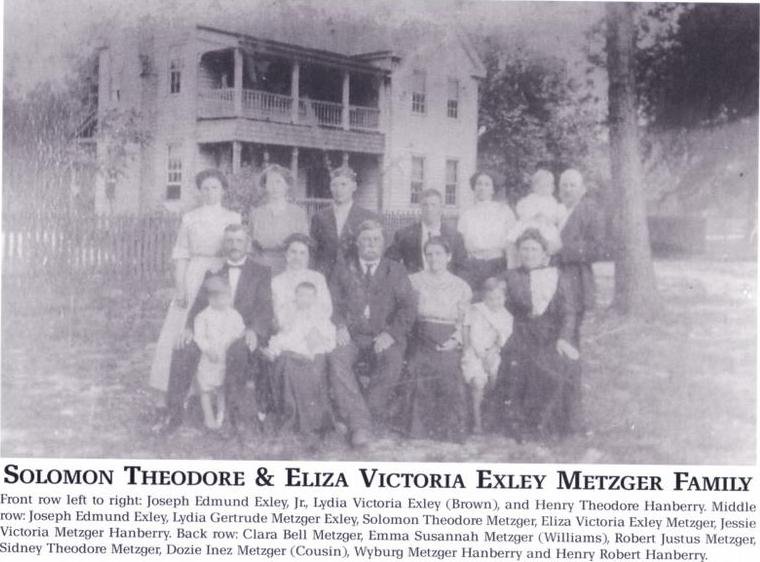Continued from Sept. 6. The following was written in 1976 by Mrs. Emma Metzger Williams (b. 1895, d. 1984), widow of Joseph Elliott Williams. Mrs. Emma was a retired Clyo School teacher.
Many were their experiences told to us children by our parents on cold winter evenings as we gathered around the large fireplace, gleaming with golden coals produced by burning oak logs brought in from the forest. The following were some of the experiences related to us as we listened wide-eyed and thrilled with it all:
My parents were quite young, but old enough to have vivid memories of the Civil War between the Northern and Southern states when our section was overrun by Northern soldiers (or Yankees as they were called). There was much pillaging done by the enemy. Cattle, fowl, crops, food of all descriptions, were carried away leaving our people with little or nothing to eat.
One cold day as my mother, her mother and sisters were wondering just what could happen next, a young Yankee soldier came in and warmed himself by the fire. As he sat there he carved his name on the wall … David McAllister.
Soon another Yankee soldier walked in. David, evidently feeling sorry for my mother and her family, said, “Butch, you’ll have to go farther than here for these people have been eating parched corn all day.” My mother always felt kindly toward this soldier who sent Butch on his way.
My mother always delighted in telling how she saved a jug of cane syrup by removing a growing gourd carefully from its resting place on the ground with a spoon, dug a hole large enough to place the jug in, covered it with dirt, then placed the gourd back where it was growing so that no one could tell that it had been disturbed. Although the enemy would thrust their spears into the ground hunting for buried food, this little girl managed to outwit them this time.
On another occasion, when the enemy soldiers were looking for food, my mother’s youngest sister, Aunt Rebecca, then a very small girl, ran to the sweet potato bank (where the potatoes were stored for winter use) and perching herself on top of the bank, stretching her little dress trying to cover it cried, “Please don’t take our potatoes, if you do we’ll starve.” The little girl’s pleas paid off. The potatoes were spared.
Other tales told to us, some of which were real, others bordering on the supernatural (the scary ghost stories all were thrillers and among our favorites and we would ask for them over and over again) were as follows:
Aunt Lydia Exley, who made her home with us, became ill with pneumonia. Gertrude, her favorite niece, was sitting by her bedside caring for her and for no special reason she looked at the palm of her hand. There in bold capital letters was the word (DIE) which at first was dim but became brighter as she looked.
Mama’s sister, Lavina Metzger, was sick with a terminal disease. Being very religious; she often quoted verses from the Bible. One afternoon, she was sitting on the porch of their little log cabin home, Dora (Dosie) repeated the following words, “Come Holy Spirit, heavenly dove with light and power from above,” and a beautiful white dove came and hovered over her head. Dosie covered her face with her hands, awed by this beautiful sight. Aunt Lavina said, “Don’t be afraid my child, it’s the Lord’s work.”
This frightening story was told to my mother by her mother and passed on to us:
One day when my grandmother’s sisters were taking her for a wagon ride down a country road near their home, probably in the Ebenezer neighborhood, they saw two men carrying a headless man hanging from a pole. Very frightened, they picked up my grandmother and ran for home, relating what they had seen. Several days after this occurrence, a horse equipped with a new saddle and bridle was wandering in the woods nearby. The horse, saddle and bridle were sold at public auction, as it was unclaimed by anyone. It was assumed that the headless man seen by the children had been robbed and murdered by the two carrying the body. This incident carries a ghostly tale as follows:
When a person walked on a footlog spanning a stream where the headless man was carried, loud moans could be heard, supposedly coming from the drops of the blood spilled from the man’s blood along the way. The story goes on to say that years after, human bones were found in an old abandoned well in a field nearby. After the bones were discovered, the groaning ceased.
This article was edited and compiled by from the HES files by Susan Exley. If you have questions, photographs or comments to contribute, please contact her at 754-6681 or email susanexley@historiceffinghamsociety.org.








